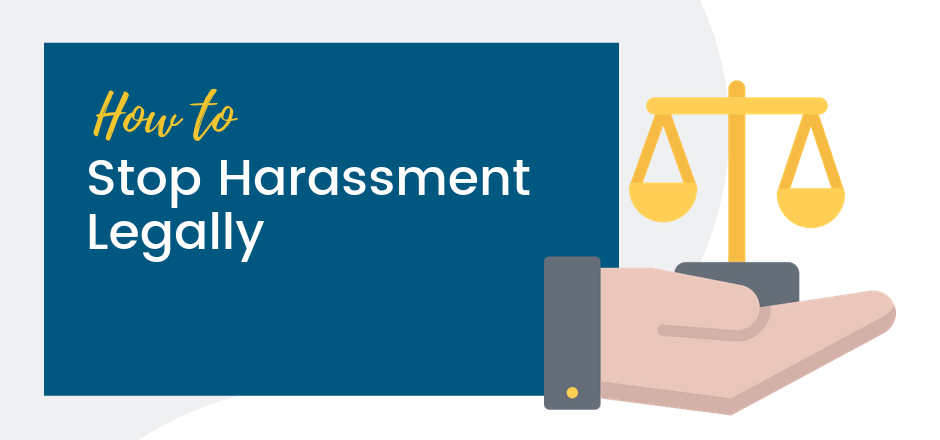How to Stop Someone from Harassing You Legally
If you find yourself in a situation where someone is consistently harassing you one way or another, you may be wondering if you can call upon the law to stop the harassment once and for all.
In this article, we’re taking a closer look at how to stop someone from harassing you legally.

How to Stop Someone from Harassing You Legally
In an ideal world, people would treat each other with respect. No one would ever stalk, harass, or otherwise behave inappropriately toward anyone else. Unfortunately, the reality of the world we live in is that there will always be a few people who don’t show respect.
When someone takes disrespect to the next level, making you feel intimidated, afraid, or threatened, the law often considers their behavior harassment. This is especially true if you ask them to stop and they refuse or continue to violate your boundaries.
Being harassed can be an extremely frightening and difficult experience. You may feel as though your hands are tied and any attempt to get help will make the situation worse, but you do have options.
Here’s how to stop someone from harassing you legally.
What is Harassment?
Under the law, only certain actions qualify as harassment. Most of these behaviors relate directly to feeling uncomfortable or personal safety, but there is a considerable amount of grey area that can make them difficult to identify.
Harassment typically:
- Makes you feel threatened or violates your boundaries
- Involves the harasser ignoring clear requests to stop
- Involves verbal, physical, or sexual abuse
For example, a co-worker who repeatedly hits on you or touches certain parts of your body is engaging in sexual harassment in the workplace. Someone who refuses to stop calling you, insulting and yelling at you, is also engaging in harassment, as is someone who stalks you, cyberbullies you, or breaks your property in an effort to intimidate you.
Having a run-of-the-mill argument, on the other hand, isn’t generally considered harassment – this is just part of the human experience occasionally. Likewise, you cannot make a claim of harassment just because of someone insults you, calls you one time or otherwise interacts with you briefly unless the manner in which they interact is abusive and severe.
Related: Find a Sexual Harassment Lawyer in Los Angeles
Step One: Stay Safe
Someone who is willing to break the law and violate your personal space in an effort to harass you is very likely to be unpredictable or even dangerous. If at any point you feel afraid the person may physically harm you or someone you love, call the police immediately – use 911 if the situation is urgent.
If you feel the issue isn’t urgent, but still do not feel safe, it is acceptable to call your local police department’s non-emergency line instead. Police can take a report, warn the person to stay away from you, or even arrest them if they continue to cross the line time and time again.
Never feel you need to handle issues of harassment on your own or in private just to “save face” or prevent repercussions. Harassment is not your fault. The real fault lies entirely with the person who crossed the line.
Related: What Constitutes Harassment from a Neighbor?
Clearly Tell the Person to Stop
If it is safe to do so, call the person out on their unacceptable behavior and demand they stop. Speak calmly but firmly, focusing on the behavior itself rather than insulting the individual’s personal character. Your goal is to tell them what they’re doing wrong and directly indicate your desire for them to stop.
INC writer Karen Tiber Leland suggests using this word-based formula:
“Do not X; that’s harassment.”
Here are a few examples of what this might look like in different scenarios:
- [Sexual Harassment] Stop touching me – that’s sexual harassment.
- [Physical Harassment] Raising your fist to me is harassment. Please stop.
- [Verbal Harassment] Stop insulting me – this is verbal harassment.
- [Other] Stop calling me – I don’t want to be in contact with you. If you continue to call me, I will contact the police.
If you don’t want to claim harassment directly, you should at least tell the person what they’re doing and the fact that you don’t want them to do it. This sets the standard for how you want to be treated and can even be used in court later on.
Record Every Incident
Whether it’s the first time or the fortieth time, you should immediately begin documenting any issues related to the harassment. If they continue to call you, write down the date and time. If they continue to hit on you at work, note when it happened, what they said, and how they responded to requests to stop.
Save any texts, emails, and recorded conversations that prove the harassment. The police can use this information to arrest and charge the person.
Don’t be afraid to ask witnesses for their personal account. If someone sees the harassment take place, take down their name and telephone number.
After You File a Police Report
If you file a police report and tell the person to stop, yet they continue to harass you, you may be able to ask for a no-contact or restraining order. This is an official document signed by a judge that prevents the individual from engaging in problematic behavior. In most cases, it requires that they remain a certain distance from you at all times, too (e.g., 50 feet).
You can initiate the process of filing for a restraining order at your local police station. Be aware that you will need to provide evidence of the harassment. Even if the order is approved, you’ll need to have an adult over the age of 18 serve notice of the order to the person harassing you before it becomes effective.
Need emergency protection? Some jurisdictions may give you the option of asking for an emergency no-contact order. This is generally used only when there is clear evidence of transgression or the suspicion that someone’s behavior might escalate to the point of a physical attack.
If you are approved for a no-contact order, and the individual ignores it and contacts or harasses you anyway, report the incident to the police immediately. They can be arrested and charged as a result of violating the court order.
Civil Suits for Harassment
You may, in some cases, have the option to file a civil suit against someone for harassment. While this is rare, it can help you recoup costs associated with pain and suffering, loss of income, or medical bills directly related to the attack or ongoing harassment. For example, you might sue your employer for failing to intervene when someone is sexually harassing you at work. Or, you might sue someone who is stalking you so severely that you develop Post-Traumatic Stress Disorder (PTSD) as a result – especially if they refuse to pay attention to the restraining order.
Be aware that suing someone for harassment isn’t easy, and it may cause an escalation of behavior. If you choose this route, or if you need more advance on how to stop someone from harassing you legally, you should work closely with an attorney throughout the entire process. You deserve to feel safe.
Are you in search for a certified attorney to represent you?
Let us help you find one today!


